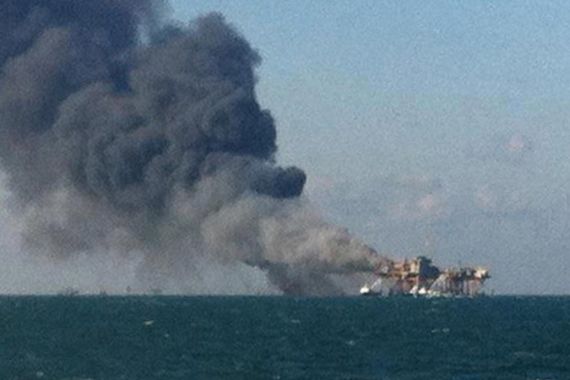Two missing in oil rig fire in Gulf of Mexico
Two people missing and eleven injured after an oil rig burst into flames about 27km offshore from Grand Isle, Louisiana.

An oil platform in the Gulf of Mexico off the Louisiana coast has exploded, leaving two people missing and badly injuring several others, recalling the horror of the 2010 Deepwater Horizon disaster.
The fire ignited on Friday when workers were welding a pipe on the deck of the shallow-water platform operated by Houston-based Black Elk Energy. Eleven workers were injured, including four who suffered severe burns.
Keep reading
list of 4 itemsAfter the Hurricane
World’s coral reefs face global bleaching crisis
Why is Germany maintaining economic ties with China?
The fire was extinguished, and the US Coast Guard said there appeared to be little risk of a major oil spill like the one that followed rupture of BP Plc’s ‘s mile-deep Macondo well in 2010.
Unlike Macondo, no oil was flowing up to the Black Elk platform at the time of the explosion because production was shut off before the fire.
Black Elk told authorities that any spill could be as little as 28 gallons. When the platform caught fire, 22 workers were aboard, the Coast Guard said.
Search effort
The Coast Guard said 11 people were airlifted to hospitals while nine others were evacuated to other nearby energy facilities. Search and rescue helicopters were scouring the area, located around 17 miles south of Grand Isle, Louisiana.
No fatalities have been confirmed but two workers were missing. The 11 hurt included four who suffered burns and were in critical condition at Louisiana’s West Jefferson Medical Center, a hospital spokeswoman said.
The incident happened a day after oil giant BP reached an agreement to pay record penalties of $4.5 billion for its role in the 2010 Macondo disaster, which killed 11 workers and spewed 4.9 million barrels of oil into the Gulf.
Black Elk’s platform sits in 56 feet of water and was not producing oil, unlike the rig involved in the BP disaster, which had been drilling in waters nearly a mile deep.
“They were not actively drilling,” said Coast Guard spokesman Glenn Sanchez. “They were cutting a pipe or doing some type of maintenance that may have resulted in the explosion and fire.”
The federal Bureau of Safety and Environmental Enforcement (BSEE), which enforces offshore drilling regulations, said it was sending safety inspectors to the Black Elk platform.
Black Elk spokeswoman Leslie Hoffman said an emergency response was under way, but declined further comment.
Federal data and SEC filings show that Black Elk, a minor producer in the Gulf, has a recent history of close calls, platform incidents and fines, including a $300,000 federal penalty it paid in September.
Safety standards
The incident could reignite a national debate over safety standards for offshore drilling. After the Deepwater Horizon spill, the government overhauled regulations and imposed a ban on offshore drilling that lasted for several months.
“This incident raises a number of questions about the nature and adequacy of safety measures on this offshore rig,” said US Representative Ed Markey Of Massachusetts, the ranking Democrat on the House National Resources Committee.
Frances Beinecke, president of the Natural Resources Defence Council said the explosion was “a sad reminder that offshore drilling is an inherently dangerous business, and that “workers and communities are put in harm’s way every day”.
“I don’t think there’s any insurance policy that can be issued that this will never happen again,” said former US Senator Bob Graham, who co-chaired a White House panel that probed the 2010 spill.
Graham said Friday’s accident was unusual because it happened in shallow waters, where the oil industry has been operating for more than 70 years, rather than the more technically challenging deepwater arena.